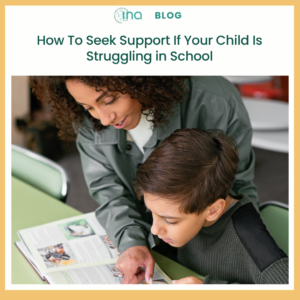 By Chris Lock
By Chris Lock
From time to time, every child is bound to find some aspects of being a school student challenging. Topics that are hard to grasp, understanding teenage emotions and experiences, and having to make life-changing decisions – it’s a lot for any young person to contend with.
Challenges and obstacles are an inevitable part of any young person’s educational journey – and ultimately their development into adulthood. As difficult as these conversations can be, addressing academic struggles sooner rather than later can prevent long-term educational impacts.
In this post, we explore three key steps parents can take when looking to help their children to overcome educational barriers, to support both their academic progress and their personal wellbeing.
Identify the problem
To provide the best support possible, it’s first important to understand exactly what it is your child is struggling with. There are lots of reasons why they might be finding school difficult. Sometimes, it’ll be fairly obvious – perhaps they’re regularly missing homework deadlines or their grades have dipped on their report card. Other times, you might only notice a subtle difference in their mood or educational output.
In some cases, certain challenges at school could be an indication of neurodiversity. And, with 66% of students with Autism Spectrum Disorder falling out of education within the first two years after leaving high school, finding strategies to support them as soon as you can is key to promoting better academic outcomes.
Whatever the challenge is, encouraging open communication is a crucial first step. Although teenagers in particular may find it difficult to open up, they’re more likely to share the thoughts in their head when they feel that they’re able to do so in a supportive and non-judgmental environment. Provide plenty of positive reinforcement, and strive to understand their perspective, reminding yourself of the challenges everyone faces during this part of our lives.
Speak with the teachers
Effective communication with teachers is crucial for parents who want to support a child struggling in school. Staff will be able to provide key insights into their academic performance that your child might not share – this allows you to then work together to overcome any prevalent issues.
Although you can reach out to the school whenever you need to, parent-teacher conferences are a great opportunity to build these channels of communication. To make the most of them, consider any questions or topics you want to discuss in advance – this will help to ensure a productive dialog. Collaborative efforts between parents and teachers can significantly enhance a child’s academic journey, providing the support and consistency they need to succeed.
Consider external support
After speaking with your child and their teachers, you may have all the information you need to proactively start providing the support they require. Alternatively, you may deem it necessary to seek external advice or support beyond the school’s (or your own) resources. There are plenty of options available: private tutors, academic enrichment programs, and counseling are just a few of the most common.
Depending on your child’s needs, finding an avenue of support that works for them can offer benefits to both their academic pursuits and mental health, with the two often intrinsically linked. If you think this is the best approach, make sure you involve your child at every stage of the process, and carefully research all the options available – considering their input throughout.
Author bio: Chris Lock
Having worked in education for more than a decade, Chris is well-versed in the trials and tribulations of being a school student. He advocates for the importance of a healthy teacher-parent relationship when it comes to supporting young people through their studies. Outside of the classroom, Chris works on a freelance basis. He creates content on a range of topics, from education to sport. Through his posts, Chris aims to both educate and inspire his readers to make positive changes in their lives.
